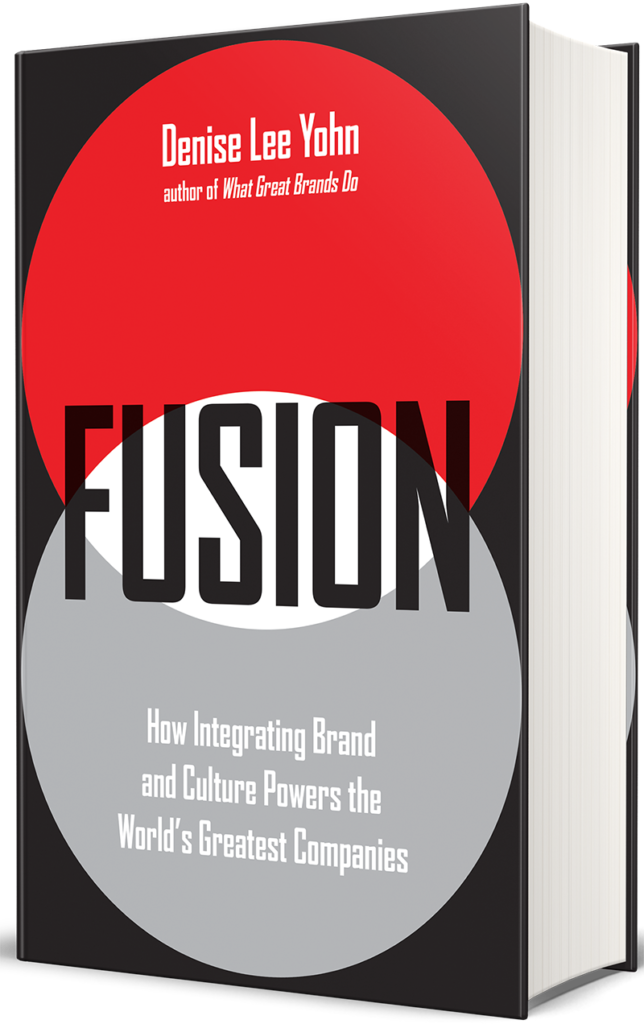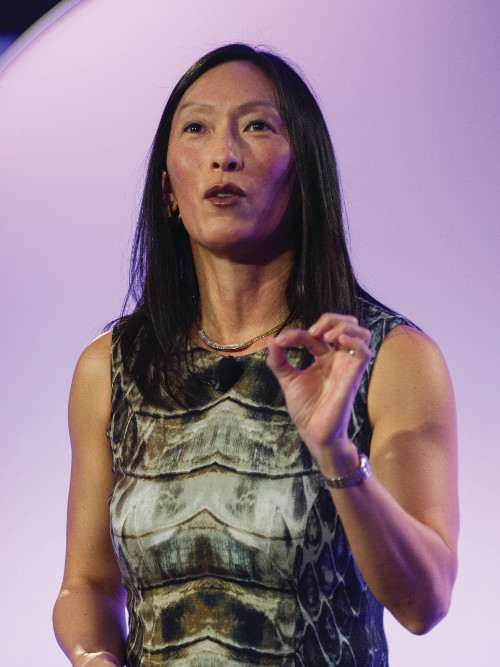Prolific Writer, Speaker, Consultant. Denise Lee Yohn has over the years dismantled conventional norms and articulated her own code on how to achieve true brand leadership. Her two books ‘ What Great Brands Do ‘ and her new one ‘ Fusion ‘ bears comprehensive testimony to her understanding of the brand building space. In a freewheeling chat, here she deep dives further and shares with BrandKnew her views on culture, brand building, business building and much more.
BK: You have contributed to some of the world’s leading publications. What triggered your interest in writing?
DLY: I’ve always loved to write – I consider it a craft and I’m always honing my writing skills.

BK: What triggered your first book ‘ What Great Brands Do’? And what has been your learnings from that book that you have leveraged over time?
DLY: I decided to write What Great Brands Do for two primary reasons. The first was that it seemed there was – and still is – a lot of misperceptions about how great brands are built and I wanted to set the record straight. The second was that I knew I needed to have a published book to establish myself as a professional speaker, so I chose to write about my passion and my primary keynote topic, brand-building.
BK: You have been on both brand side with the likes of Sony and on the agency side for brands like Land Rover and Burger King. How has the integrated experience helped you professionally?
DLY: I understand the challenges experienced by people on both sides of the table – and the misalignment between the two groups that can arise. Moreover, the positions I held at companies honed my research, analytical, product management, and culture-building skills, while at advertising agencies I learned about creative communications. The combination of all these disciplines has served me well in my work building brands.
BK: There is an oft used cliché saying ‘ Culture eats strategy for breakfast ‘- what are your thoughts on it?
DLY: I actually don’t care for it because people usually use it to elevate the importance of culture over strategy, while I see the two as equally important. And in some ways, I agree with Jim Collins, who says culture IS strategy.
BK: What according to you should come first in terms of priority in an organization- Brand or Culture? Why?
DLY: Both are equally important – and as I write in FUSION: How Integrating Brand and Culture Powers the World’s Greatest Companies, they must be mutually reinforcing and tightly aligned.

BK: Could you take us through what motivated you in writing your book Fusion?
DLY: I’ve always believed that brand-building starts inside, meaning that if you want to build a strong, valuable brand, you must start by cultivating a strong brand-led culture inside your organization. I wrote about this principle in the first chapter of What Great Brands Do and I head from many folks who wanted to learn more about it.
Also, there seems to be a culture crisis in the business world today. So many companies struggle with issues of diversity, equality, and sexual harassment while fighting a fierce war for talent — and so many employees are not engaged at work. But there were few resources that explained how to cultivate a healthy, effective, sustainable culture and so I wanted to crack the code on culture-building the same way I had done on brand-building with my first book.
BK: Don’t you think Mission Statements are grossly over rated and most cases don’t go beyond lip service? Is it herd mentality at work here? Or culture has a part to play?
DLY: Most Mission Statements are too generic and one-sidedly focused on shareholders that they don’t provide guidance and inspiration for the organization, its employees, its brand development, and its customers. That’s why in FUSION, I recommend crafting an overarching purpose that embodies what drives the organization as a business as well as a brand.

BK: What in your scheme of things will the pecking order look like: Brand Building or Business Building? And where exactly does Culture of an organization intersect in these?
DLY: In What Great Brands Do, I explain the brand-as-business management approach, in which your brand is your business and vice versa. You can’t build one without the other and you really shouldn’t distinguish between them. That means that brand-building is a strategic management responsibility that starts with cultivating a brand-led culture and involves using your brand as a filter for everything you do as an organization.
BK: Undoubtedly there is an over emphasis(atleast on paper) at brands on ‘ customer experience ‘. Do you think ‘ employee experience ‘ should come before customer experience?
DLY: Again, the two need to be aligned and integrated. You should determine the customer experience that will deliver on your brand values, attributes, and positioning, and then design an employee experience that enables your employees to develop and execute that experience.
BK: At ISD Global we have patented a concept called the UFP(Unique Feelings Proposition)and how that is more important than USP( Unique Selling Proposition– which in this over commoditized world is passe). Where do you see your views going towards on this?
DLY: It makes a lot of sense for two reasons. First, it puts the emphasis on the customer – instead of focusing on what we want the company to do, it is about what we want the customer to do. Second, it speaks to the fact that humans are emotional beings, so we make product and brand decisions based on how they make us feel. So, great brands succeed by creating an emotional connection with customers.
BK: You have been working with a lot of Blue chip brands over the years. Which brand/s in your opinion have really got their ‘ culture act ‘ absolutely spot on?
DLY: I have not worked with Amazon, but all my research on that company indicates that its culture is powerful and productive – it aligns and unifies all employees with the company’s overarching purpose, which in turns produces phenomenal results.
BK: In your book Fusion you talk about ‘ Integrating Brand and Culture ‘ for stupendous results- could you elaborate on that?
DLY: Most business leaders consider brand and culture as two separate things — and they delegate brand-building to the marketing department and culture-building to the human resources department. But if you fuse the two—create an interdependent and mutually reinforcing relationship between how your organization thinks and acts on the inside and how it is perceived and experienced on the outside—you unleash power that isn’t possible by simply cultivating one or the other alone.
With brand-culture fusion, you future-proof your business because culture and brand are only going to increase in importance, as the need to unify and align diverse and dispersed employees is only going to grow as companies continue to globalize, workforces continue to diversify, and the pace of business continues to accelerate — and brand power is only going to become more important in the fight against commoditizing product categories, shrinking attention spans, and consolidating channels.
Fusing brand and culture also enables you to pass the high standard of authenticity that customers and employees judge companies against and every part of your business is aligned so you avoid dangerous disconnects.
And by aligning and integrating your brand and culture, you create value for customers and employees that your competitors can’t rip off or undercut because it is unique to your organization.
–
Seeking to build and grow your brand using the force of consumer insight, strategic foresight, creative disruption and technology prowess? Talk to us at +9714 3867728 or mail: info@groupisd.com or visit www.groupisd.com

